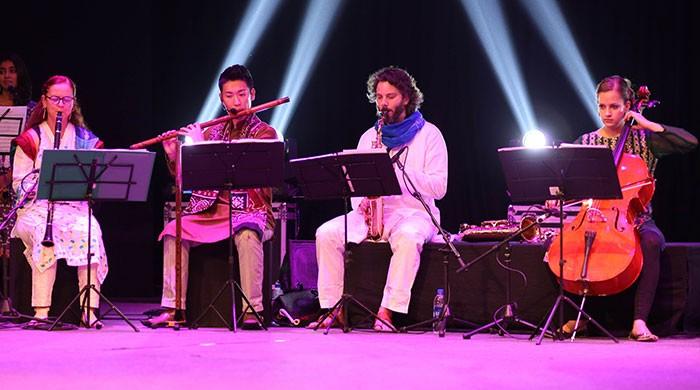
Chilly breeze swept our hair as we stepped through the gate of Karachi's National Academy of Performing Arts (NAPA) and into the cemented compound, right before the auditorium at the far-right end.
The daunting, but aesthetically-pleasing Hindu Gymkhana was brightly-lit, its Mughal architecture brought out to prominence with the strategically-placed lights beaming at the cupolas and balustrades jutting out atop its roof.
Sangat, a concert organised by the US Consulate based in the city on Friday, boasted an amalgamation of raag-based music and Western rhythms, complete with tuba, electric guitar, and percussion. A one-of-its-kind event, it featured students from University of Austin, Texas' Butler School of Music and NAPA, with composition by Ustaad Nafees Ahmed.
Being no easy feat to combine melodies of the East with tunes from the West, Sangat, however, was a well-thought-out and extraordinary performance. It was the outcome of a three-year-long collaboration between the two schools.
Dr. Sonia Seeman, a shy yet poised person who had directed the musical night, welcomed the audience in her opening comments. She humbly highlighted her preference for being recognised for facilitating the event over her directorial part, and inundated her dialogue with laughs and energy.
The commencing piece, an improvisational one by Ustaad Nafees and cellist Julia, was soothingly-rich with cello's warm hum and the accompanying high-pitched sitar.
Karachi to Austin graced the audience's ears second, with an amazing combination of saxophone and flute, ruled by aspiring artist Arsalan's finger-work on the electric guitar. The work was commendable, as it brought attendees to a joyous, animated mood.
Time, in its essence, cannot be encapsulated; however, the musicians' attempt at doing so – through Morning, Sun of the 10th, and Moon of 15th – was an accomplishment worth the while. The set of three – Triptych – was complemented by smooth voices of the choir, who did a marvelous job at bringing to life emotions felt during various times of the day; morning reminded of the rising sun, with high-spirited birds, while the second and third compositions were a curious, but successful blend of different instruments, conducted to play strings of one's heart.
A taste of romance was offered to the music lovers in Tum, a captivating song that grew into the audience's souls via the outstanding tabla, flute, and cello. The subsequent piece marked the end of first segment.
US Consulate public affairs officer John Warner – acting Consul-General for the night – lauded the musicians and their hard work. "I'm just transfixed. […] It's more than just music."
Warner went on to say that it was "not just musicians collaborating, but institutions collaborating" to build capacity. He noted that such events boost diversity, adding that these "relationships and that collaboration will go on and on for years and years."
In his remarks, UT-A's South Asia Institute director Professor Kamran Ali, dressed in a light chocolate-brown waistcoat, shared rehearsals stories and memories of the American students' experience in the city of lights.
Ali said that this partnership brought together "different traditions of knowledge, traditions of aesthetics, traditions performance… [It] was a unique experiment." He mentioned that students from NAPA students had spent one semester abroad at UT-A.
With Hansandhvich commenced the latter part of the evening, making way to for a livelier vibe. It included Darbari Jazz that left the audience swaying with glee.
The light-hearted, thoroughly-pleasurable music affair came to an end with Sufi qawwali Allah Hoo, wherein both Pakistani students and their American counterparts partook in singing with great fervour.
Laura, the blond-haired cellist, adored being a part of the qawwali. "It has a lot emotional impact for me as well." She teaches the Music and World Cultures class back in Austin, where "qawwali is one of the styles that we talk about, so it's really cool for me to actually convey to [my students] how much meaning it has."
She stated that her memories of Karachi are ecstatic. "People have been extremely welcoming; [they have] so much enthusiasm for us. Our experience has been truly one of the best of my life."
Bespectacled Chris, the percussionist, loved Karachiites. "A phenomenal experience, not just the city, it's the people who make this city," he said.
Towards the end, we met Lee, who rocked the sax. On his fourth trip to Karachi now, he acknowledged making good friends. "I keep coming back specially for the people. The people in the Sangat ensemble became good friends to me. It's become a home away from home."
Legendary actor Zia Mohyeddin, whose poetry recitations command pin-drop silence as fans sit mesmerized in awe, was also present in the audience, flaunting a crisp grey suit, along with NAPA program director Arshad Mehmood, known for his roles in hit TV series Aangan Terha.
No comments:
Post a Comment